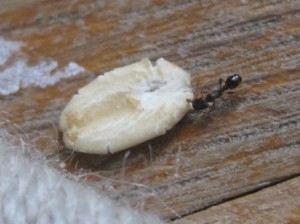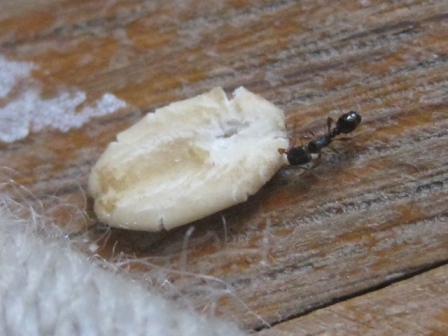 This morning I was stretched on my bed, enjoying the last days of relative leisure in our home in Sofia – in couple of days we will be heading back to Manchester and my life is going to take a sharp turn towards regimented self-discipline (ok, motivation), long working days and stress I’ll be stressing about.
This morning I was stretched on my bed, enjoying the last days of relative leisure in our home in Sofia – in couple of days we will be heading back to Manchester and my life is going to take a sharp turn towards regimented self-discipline (ok, motivation), long working days and stress I’ll be stressing about.
‘Come! Come quick and have a look at this!’ – John called, pulling me out of my novel.
I felt a flicker of worry moving through my stomach – what has gone wrong? Our son is not at home, so it couldn’t be him. Rushing into the sitting room I found John crouching on the floor, looking at the picture you can see – an ant dragging an oat grain.
Now, I really don’t like insects; this is a fact that no work on my personality and preferences will ever change. But this ant was so impressive; it had already dragged the grain, so much bigger than itself, over 5-6 meters of Persian rug (really hard to drag anything on this one) and was very close to its destination – a little crack in the parquet floor where the store cupboard of the ant colony obviously is. Even more amazing, when it was near the crack two other little ants came to help. Sweet!
This made me think that different animals are to a degree archetypes of human attitudes to life and money. And that three types are particularly representative. These are ants, birds and locusts.
Ants
The cluster of human attitudes to life and money that can falls under ‘ants’ type is characterised by:
- Planning and acting with the future in mind;
- Storing and ensuring that the colony/family will survive;
- Creating conditions for survival and prosperity anywhere (we watched the ant with the grain in out fifth floor urban apartment but it could have been in a field);
- Persistent hard work;
- Working smart to leverage its strengths;
- Productive cooperation with other.
As a result, ants create the conditions of their prosperity through their hard work, persistence and natural intelligence.
Birds
Birds ensure their survival and prosperity in a way different from the ants in that they usually migrate to the conditions they need.
Once migrated, however, birds integrate in the eco-system and build a life for themselves. They don’t destroy their environment but once the conditions they need have changed they are quick to migrate and find new places.
Locusts
Locusts are migratory like birds; and like birds they also don’t store resources for the future but find them by accident or design. However, locusts are different from birds in that they don’t integrate in their new environment – they completely and utterly destroy it.
Daniel Coleman, author of Emotional Intelligence, describes something very similar to this type in managers he refers to SOB (Sons of Bitches) – these are the managers who get top positions in organisations, destroy them and before anyone catches them out they move on. Many people do this to others or even to their own finances.
Final thoughts
These are ‘ideal types’ and usually we could expect to display a combination of characteristics in our attitudes to life and money. I know that I did behave as a locust for a short period in my life – and am still possibly recovering from it. But now I am more on the ants/birds side of the spectrum.
How about you?

Hmmm….that’s a tough one. I’ve been a bird and I’ve been an ant. I suppose that means I’m an ant until being an ant makes no sense anymore, then I become a bird.
Apparently I’m just a mess!
For the record, I’m always GOING for being the ant. I try to build a sustainable environment that will last well beyond me wherever I go. I’ve found others that build faster, but their houses also have crumbled faster. Whenever I do anything I consider the long view first.
@AverageJoe: No, you are not a mess; I suspect that most of us will fall between compatible types. I myself am between an ant and a bird now.
I think attitude particularly positive attitude overcomes your shortcomings and helps you accomplish your goals.
I love the book Emotional Intelligence. This was a creative article, very thought provoking.
@Barbara: Thanks. As to Emotional intelligence – it is a good book. It brought light on something that was continuously underplayed in analysis of organisational behaviour and amangement.
Great analogy. I love it.
I too have been a locust in the past but I have since learned my lesson. I am much more ant like now and my life has been much better since. I have actually always found ants impressive. What they can do with their little bodies strength wise, not to mention their intelligence.
@Miss T: Ants are completely impressive. Watching the ones in Sofia was great – and they ‘drive’ on the left, as John noticed.
I’m an ant at heart, but can’t seem to find enough oats to take back to the colony.
@Brent: Good luck with finding the oats, Brent. I am sure that your brand is just around the corner.
Although I have never read Emotional Intelligence, I have actually learned a lot from it because it is so popular that the ideas it espouses frequently find their ways into other content that I am reading. I think I will have to add it to my overall reading list.
@Roshawn: Certainly worth making it on your reading list.